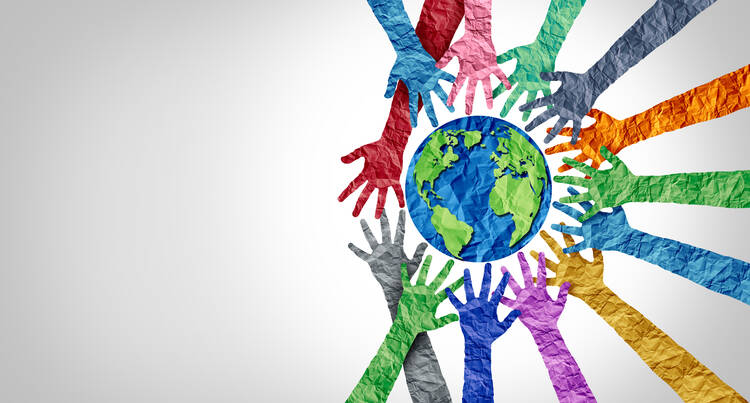This article is a response to “Will Catholic universities survive the upheaval in higher education? The next 10 years will tell,” a feature by Charles C. Camosy. Read more views on this issue linked at the bottom of this article.
If the Covid-19 pandemic should teach us anything, it is that the unexpected will come at us. And when it does, we have a choice: to take care only of ourselves, what Pope Francis calls “the hyperinflation of the individual,” or to take stock, look at the suffering world and work for change that has the common good at heart.
Charles Camosy’s analysis of the future of higher education, which unfortunately stokes divisions and uses vague references to “the culture to be resisted,” does not get us closer to envisioning the kind of work we need to do. Most fundamentally, I do not find a compelling reason in his essay for the “why” of higher education, which is where this conversation needs to begin. Why should people of faith care if we have colleges and universities at all?
The “why” of higher education today must go beyond the day-to-day of campus life or faculty politics. If, as is made evident by the kind of critical theories that are criticized by Dr. Camosy, higher education in the United States has for most of its history ensured the preservation and continuation of privilege based on race and class (remember the college admissions scandal?), then our current moment calls for new models that will reverse this. The model for today’s university must involve working for true societal transformation, equipping more of us to be thoughtfully critical and engaged in a shared civic life of genuinely communal concerns. It must involve inviting more of us into conversations that build a bridge across borders, continents, classes and races.
Higher education is at its best when it allows us to explore the many intersections where we can meet and discover “us-ness,” while celebrating the beauty of difference.
Higher education is at its best when it allows us to explore the many intersections where we can meet and discover “us-ness,” while celebrating the beauty of difference. This has been a focus of my own work, which resulted in the book Teaching Global Theologies: Power and Praxis. This expansive view of who we mean by us makes clear that the Catholic intellectual tradition we teach has to be reimagined to make room for the writings of the Jesuit martyrs of El Salvador, the forceful critiques of feminist theologies, the unceasing voices of economic and post-colonial analysis from the global South, and the ideas of our young people, who are forging courageous alliances in defense of planetary flourishing.
Our campuses have to make present the disenfranchised many, not by pigeonholing “Hispanics” as being well suited for small schools close to their homes, as Dr. Camosy suggests, but by having the presence of young people from very dissimilar communities on all of our campuses, shaking us up, changing our spaces, creating a new reality steeped in solidarity. Higher education should be abundant, not a rare privilege for the few. If that means seeking partnerships with corporations or government wherever these are possible, so we can multiply resources, then let us do it.
Let us seek a true culture of encounter where we can affect each other’s worlds. If Google wants to put funding into education, then perhaps we can work together so they will come to embrace the centrality of ethics. As we engage beyond our spaces, we can work to bring about the challenging work that Pope Francis describes inLet Us Dream, his book with Austen Ivereigh, as redesigning “the economy so that it can offer every person access to a dignified existence while protecting and regenerating the natural world.”
There are many ways that we are Catholic. We may be described pejoratively as “woke,” but my community of accountability, my students, want to be seen—and I want them to know I see them. Jesus’ extraordinarily countercultural practice was to invite outsiders to share the table and in that unlikely fellowship begin creating the kin-dom of God. This radical inclusion is what gets us past pointless culture wars and into the Good News.
More views on the crisis in higher education:
- Charles C. Camosy: Will Catholic universities survive the upheaval in higher education? The next 10 years will tell.
- Vincent D. Rougeau:How do we prepare Catholic universities for success? Focus on the marginalized.
- Jessica Wrobleski:The economic model for college is broken. Catholic social teaching points a way forward.
- Pavlos Papadopoulos: The best way for Catholic universities to preserve Catholic identity? Hire Catholics.
- Michael J. Garanzini:Worried about the future of Catholic higher education? Look to our students for hope.








